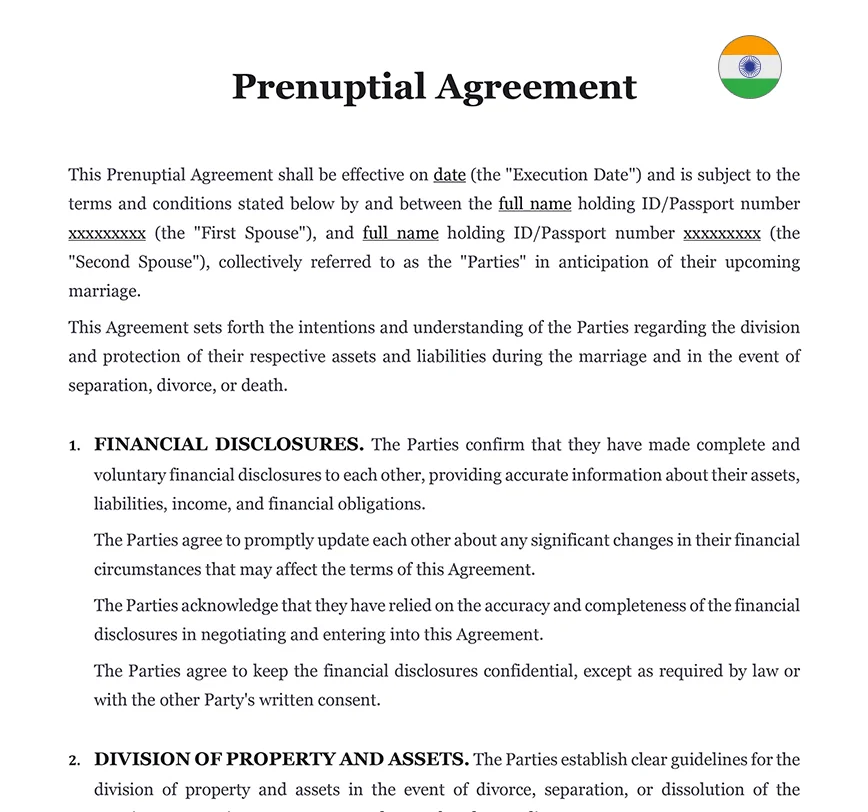Ready to use legal template
Drafted by experienced lawyers
Compliant with Indian law
Ready to use legal template
Drafted by lawyers
Compliant with Indian law
Home › Family Law › Prenuptial Agreement
Learn more about Prenuptial Agreement in India
A prenuptial agreement, often referred to as a prenup, is a legally binding contract entered into by a couple before they get married or enter into a civil partnership. It outlines the rights and obligations of each spouse/partner in the event of a divorce, separation, or death. Prenuptial agreements are designed to address various financial and property matters and provide clarity and protection for both parties involved. Here are some key aspects of a prenuptial agreement:
📄 Related documents
Table of contents
-
What is a Prenuptial Agreement?
-
When is a Prenuptial Agreement is used in India?
-
What should a Prenuptial Agreement include?
-
How does a Prenuptial Agreement protect both spouses?
-
How are assets commonly shared between spouses in India?
-
Can a Prenuptial Agreement replace a Marriage Contract?
-
What are the risks of not having a Prenuptial Agreement?
What is a Prenuptial Agreement?
A Prenuptial Agreement, commonly referred to as a “prenup” or “premarital agreement,” is a legally binding contract designed for couples in India who are planning to get married or enter into a civil partnership. This agreement serves to define the financial and property rights of each party in the event of a divorce, separation, or the death of one spouse within the legal framework of India.
This ensures that the agreement complies with Indian laws and safeguards the individual interests of both parties. Prenuptial Agreements are valuable tools for any couple in India seeking to clarify and protect their financial interests before embarking on marriage.
When is a Prenuptial Agreement is used in India?
In India, a Prenuptial Agreement is typically used by couples to outline the financial arrangements and rights of each party in the event of a divorce or separation. While Prenuptial Agreements are not as common in India as in some Western countries, their use has been increasing, especially among urban, educated couples. Here are some scenarios in which a Prenuptial Agreement might be considered in India:
Protection of Assets: Couples may use a Prenuptial Agreement to specify how their assets and finances will be divided in case of a divorce. This is particularly relevant if one or both parties have significant assets or if they want to protect certain assets acquired before the marriage.
Business Interests: If one or both spouses own businesses, a Prenuptial Agreement can address how business ownership, control, and valuation will be handled in the event of a divorce. This is crucial for protecting the interests of both parties and ensuring the smooth continuation of business operations.
Clarity on Financial Responsibilities: Couples may use a Prenuptial Agreement to define each spouse’s financial responsibilities during the marriage and in the event of a separation. This could include provisions for spousal support (alimony) and the handling of debts incurred during the marriage.
Preserving Family Wealth: In cases where one or both parties come from families with substantial wealth, a Prenuptial Agreement can be used to protect family assets and inheritance rights.
Non-Monetary Contributions: Couples may use a Prenuptial Agreement to acknowledge and define non-monetary contributions to the marriage, such as career sacrifices, homemaking, or support in raising children.
What should a Prenuptial Agreement include?
A comprehensive Prenuptial Agreement should address various aspects of the financial and legal relationship between spouses, providing clarity and protection in the event of a divorce or separation. While the specific provisions may vary based on individual circumstances and jurisdiction, here are key elements that are commonly included in a Prenuptial Agreement:
1. Full Disclosure: Both parties should provide a complete and accurate disclosure of their assets, debts, income, and financial obligations. This ensures transparency and fairness in the agreement.
2. Asset Division: Specify how the couple’s assets, properties, investments, and debts will be divided in the event of divorce, separation, or death. You can outline what assets will be considered separate property and what will be treated as marital property subject to division.
3. Spousal Support: Address the issue of spousal support or alimony payments, including whether they will be paid, the amount, and the duration. This can help avoid disputes and provide clarity on financial obligations in the event of a divorce or separation.
4. Inheritance and Estate Planning: Determine how each spouse’s assets will be distributed in the event of death, particularly if there are children from previous relationships or specific inheritance wishes. This may include provisions for trusts, beneficiaries, or other estate planning considerations.
5. Debt Allocation: Address how pre-existing debts and future debts incurred during the marriage will be allocated between the parties. This can help protect each spouse from assuming responsibility for the other’s debts.
6. Business Interests: If either spouse owns a business or professional practice, the prenuptial agreement can specify how the business or practice will be valued, divided, or maintained in the event of a divorce.
7. Personal Property: Specify how personal property, such as vehicles, jewelry, artwork, or other valuable possessions, will be divided in the event of a divorce or separation.
8. Dispute Resolution: Determine the process for resolving disputes that may arise during the interpretation or enforcement of the prenuptial agreement. This can include provisions for mediation, arbitration, or the choice of jurisdiction for legal proceedings.
9. Termination or Modification: Include provisions outlining the circumstances under which the prenuptial agreement can be terminated, modified, or invalidated, such as mutual agreement or changes in circumstances.
10. Execution and Legal Advice: Ensure that both parties have had the opportunity to review the agreement, seek independent legal advice, and sign the document voluntarily and without coercion.
How does a Prenuptial Agreement protect both spouses?
A Prenuptial Agreement provides a framework for protecting the interests of both spouses by establishing clear guidelines for the division of assets, financial responsibilities, and potential spousal support in the event of a divorce or separation. For the spouse with greater assets, it offers protection by outlining how their wealth will be handled, ensuring that certain assets remain separate property, and preventing unintended financial obligations.
The spouse with fewer assets gains protection through transparency and agreed-upon terms, assuring a fair distribution of marital assets and potentially addressing spousal support concerns. The agreement also contributes to reducing potential conflicts and uncertainties during a divorce, fostering a more amicable and efficient resolution.
By facilitating open communication and negotiation before marriage, a well-crafted Prenuptial Agreement can serve as a safeguard for both parties, promoting financial security and minimizing the emotional and financial toll of a divorce. However, it is crucial for both spouses to seek independent legal advice to ensure that the agreement aligns with their individual needs and complies with applicable laws.
How are assets commonly shared between spouses in India?
In India, the division of assets between spouses is primarily governed by personal laws based on religion, and the legal framework may differ for Hindus, Muslims, Christians, and others. Here’s a general overview:
1. Hindu Marriage Act (1955)
For Hindus, Buddhists, Jains, and Sikhs, the Hindu Marriage Act applies. In the case of divorce, assets acquired during the marriage are typically divided equally between the spouses.
2. Special Marriage Act (1954)
This Act applies to marriages between persons of different religions or when one or both spouses are not affiliated with any religion. The division of assets is generally similar to that under the Hindu Marriage Act.
3. Muslim Personal Law
Under Muslim law, the financial settlement in the event of divorce can include the payment of “mehr” (a mandatory payment by the husband to the wife), maintenance (if applicable), and a fair and reasonable provision for the wife’s future.
4. Christian Marriage Act (1872)
For Christians, the Indian Divorce Act governs divorce matters. In case of divorce, the court may order the division of property based on considerations such as the financial contributions of each spouse and the needs of the children.
It’s important to note that these laws primarily address the division of assets in the absence of a Prenuptial Agreement. If a couple has a valid and enforceable Prenuptial Agreement, its terms will generally guide the distribution of assets.
The concept of “streedhan” exists in Indian culture, referring to the woman’s wealth or property that is given to her during the marriage. Streedhan is considered the woman’s exclusive property, and it is not subject to division in the event of a divorce.
Can a Prenuptial Agreement replace a Marriage Contract?
In India, a Prenuptial Agreement can be considered a type of Marriage Contract that addresses financial matters between spouses. In India, personal laws based on religion govern marriage and divorce. For Hindus, Buddhists, Jains, and Sikhs, the Hindu Marriage Act applies, and for Christians, the Indian Divorce Act. In the absence of a Prenuptial Agreement, the division of assets is generally determined by these laws. However, a valid and enforceable Prenuptial Agreement can provide an alternative arrangement for the division of assets, offering a level of financial planning and protection for both spouses.
What are the risks of not having a Prenuptial Agreement?
Not having a Prenuptial Agreement exposes couples to various risks, including the default application of jurisdictional rules for asset division and financial matters in the event of divorce. This may lead to financial uncertainty, potential disputes over spousal support, and complications in dividing business assets.
The absence of a clear agreement may also impact inheritance rights and result in disputes over non-financial aspects of the marriage, such as child custody. Without a prenup, legal proceedings can become lengthy and costly. Cultural and social stigma may discourage some couples from considering prenuptial agreements, but exploring these arrangements can provide clarity, reduce legal complications, and mitigate financial and emotional stress during a divorce.
Prenuptial AgreementTemplate (.docx)
Save on attorney fees
310 client reviews (4.8/5) ⭐⭐⭐⭐⭐
Share information
Why Themis Partner ?
Make documents forhundreds of purposes
Hundreds of documents
Instant access to our entire library of documents for India.
24/7 legal support
Free legal advice from our network of qualified lawyers.
Easily customized
Editable Word documents, unlimited revisions and copies.
Legal and Reliable
Documents written by lawyers that you can use with confidence.




